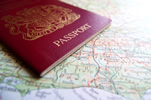Study suggests links between poor air quality and increased covid-19 infections

Study suggests links between poor air quality and increased covid-19 infections
The new study, recently undertaken by the World Bank Group, seems to indicate that those living in highly polluted areas are at more risk of contracting the virus. Worse still, the study raises the possibility that the particles causing the pollution can actually transmit the virus. It also seems that high levels of PM25 particles can be used as a predictor of numbers of confirmed cases and hospital admissions.
Expats in Thailand may be more than unhappy at the news, as Bangkok, Chiang Mai and several other regions are infamous for their high pollution levels which peak during the dry season due to the burning of agricultural waste as well as increased traffic fumes. Several times over the past year, Chiang Mai has been noted as the world’s most polluted city as burning continued unchecked in the hills. Appeals to the junta government have been made by city authorities, but no action has been taken.
However, although Chiang Mai’s expat communities may well be alarmed by the results of the study, the local government has been successful in staving off the worst of the pandemic via the introduction of a curfew, strict rules as regards behaviour and even a fortunately short-lived ban on alcohol purchase and consumption. The majority of expats in the city are retirees, some of whom legally run small businesses in the hospitality sector and are suffering financially due to the lockdowns. Even so, many are joining together to collect donations and distribute foodstuffs to locals who’ve lost their jobs in the tourism sector and are unable to subsist without help.
Related Stories:
- Is Kuwaitization the unintended result of the oil price crash? - July 20, 2020
- Expats in Malaysia still banned from overseas travel - July 17, 2020
- HSBC Asia to cut back on internal expat relocations - July 16, 2020
- Tips on integrating for newly-arrived expats - July 15, 2020
Latest News:
- Tips on a trouble-free relocation as an expat overseas - July 20, 2020
- Expats find peace in the covid-19 refuge of Dahab town - July 20, 2020
- Is Kuwaitization the unintended result of the oil price crash? - July 20, 2020
- Expats unhappy abut changes to Korean points-based visa system - July 17, 2020
- Chiang Mai and Bangkok no longer bargain locations for expats - July 17, 2020
- Expats in Malaysia still banned from overseas travel - July 17, 2020
- Vietnam welcomes expats to its safe, affordable lifestyle - July 16, 2020
- Asian tiger economies reach out to expats in Hong Kong - July 16, 2020
- HSBC Asia to cut back on internal expat relocations - July 16, 2020
- Tips on integrating for newly-arrived expats - July 15, 2020


